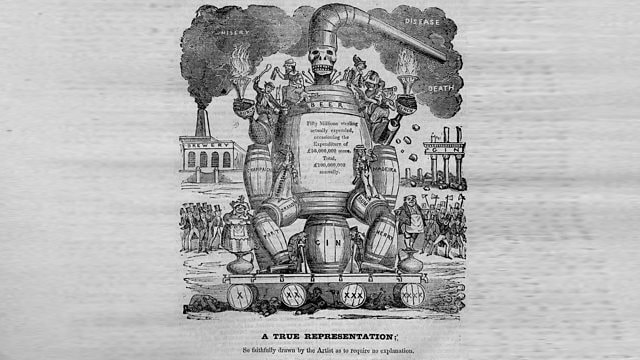|
A recent episode of Melvin Bragg's 'In Our Time' programme was on the Temperance Movement. It reminded me that when doing an after-dinner speech on Keir Hardie, I always point out that the great man would not have approved of the alcohol being consumed!
In Keir Hardie's time, drink flourished among the very poor and was probably a bigger problem than drugs are today. Hardie's stepfather could be abusive when drunk, and drink was a strong tradition in certain trades, including shipbuilding and mining. Keir Hardie and his mother believed that drink was a widespread social evil that had to be countered by social action. They saw hope in the temperance movement that had been strong in Scotland since the 1840s. Hardie took the pledge when he was seventeen. The movement was not just a puritanical and religious movement. It was strongly associated with radical liberalism and the early socialists. A tradition followed by other Scottish socialists, including John Maclean, Willie Gallagher and Tom Johnston. It was also a significant social movement with libraries and friendly societies. Temperance was arguably Hardie's first political cause. He campaigned for the strict enforcement of existing laws and legal prohibition. Hardie promoted his view in his column in the Ardrossan and Saltcoats Herald. The Good Templar membership in Cumnock had quadrupled in the 1880s, and the local press put this down to Hardie's efforts. Many of his policy prescriptions may sound dated today, but they are not a long way from the solutions advocated by many to the drugs problem today. However, it was an uphill battle, as many Liberals regarded legislation on this issue as a challenge to their freedoms. Hardie's instincts sided with state control, a precursor of his later conversion to socialism. In parliament, he supported 'local option' proposals to shut down the local liquor trade, 'Those who can take a glass or let it alone,' he said, are 'under moral obligation for the sake of weaker brethren who cannot do so, to let it alone.' Labour conference voted for state control and for local option. As the 'In our Time' programme highlighted, the temperance movement was huge in the Nineteenth century and can be seen to this day with Temperance halls in many towns. Preston was at the forefront of the movement, a radical reputation that it continues to this day as a champion of the Community Wealth Building movement. So, when you raise a glass to Keir Hardie, remember he would not have approved, for a good reason!
0 Comments
Parallels in history over a century later are fraught with difficulties. However, there are some parallels with the imperialist aims of modern Russia in their invasion of Ukraine and the financing of their interests through the UK financial system.
In Keir Hardie's day, Russia was the great dictatorship, the apogee of feudal cruelty and imperial oppression. British socialists worked closely with Russian exiles, including many Jews escaping persecutions. Hardie was particularly friendly with the nihilist Sergius Stepniak and the anarchist Prince Kropotkin, both exiles in London. He strongly supported allowing refugees into the country escaping persecution in eastern Europe during the debate over the Aliens Bill of 1905. This was when right-wing politicians were busy exploiting racial prejudice in the east end of London and other cities. The main business of the ILP Easter Conference in 1908 was to declare its opposition to the Russian government for its 'infamous tyranny' which 'condemned great numbers of our Russian comrades to imprisonment, torture, and death.’ If this sounds familiar to current events, it may well be because Vladimir Putin has a 19th-century imperialist view of Russia and a similar approach to dissidents. In arguably another analogous call, Hardie condemned an official visit to Russia by King Edward VII. Hardie protested in Parliament, accusing the King of going in order to render Russia safe for European capitalists to exploit. The root cause of the 1907 entente with Russia was the need to protect British investors in the Near East, as Russian troops invaded Persia. He accused the King of condoning Russian ‘atrocities’, referencing the shooting of political and industrial demonstrators. When the Tsar made a return visit, Hardie was one of the first to oppose the visit. In Parliament, he said the Tsar 'did not represent the people of Russia, and King Edward did not represent the people of Great Britain.’ The Tsar never left his ship at Cowes. Hardie is also well known for his opposition to war. He was present at the 1904 Congress of the International when the Russo-Japanese war broke out, which opposed that conflict, as Hardie had done earlier over the Boer War. A war he argued as being for the profits of the few, mainly Rhodes. He argued that the working class should not ‘bow to the yoke of imperialism.' Hardie, the pacifist, believed socialism was 'revolutionary' but 'that it can only be won by violent outbreak is in no sense true.’ He also opposed the First World War, and he despaired as German and French socialists supported their respective governments. The Labour Party initially declared against the war, but it also bent to the war fever of the initial war period. Even in his address to the anti-war meeting in Trafalgar Square on 2 August 1914, he had Russia in his sights, ‘We should not be in this position but for our alliance with Russia. Friends and comrades, this very square has rung with denunciations of Russian atrocities. Surely if there is one country under the sun which we ought to have no agreement with it is the foul government of anti-democratic Russia.’ Had he succeeded in uniting workers across Europe, millions of lives would have been saved. Dave Watson Secretary |
AuthorThis is the Blog of the Keir Hardie Society. Archives
March 2024
Categories |

 RSS Feed
RSS Feed